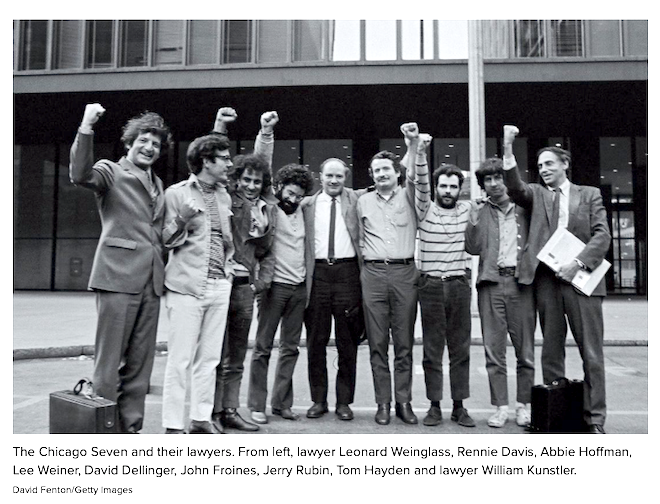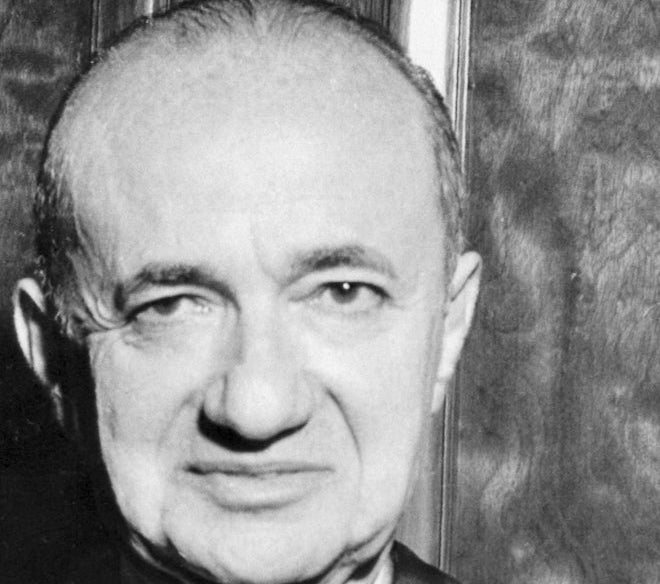Brutal America ... March 1969 and the trial of seven anti-war protesters ... Yippees ... Chicago police riot ... Biased and incompetent judge ... Contempt in all its many guises ... Miss Lumière reviews Aaron Sorkin's take on a stormy, shambolic trial

If a bad wig can de-rail an entire drama, the hair and makeup person on Netflix's new film The Trial of the Chicago 7 has a lot to answer for.
Abbie Hoffman's hippy-dippy hairpiece is so bad, it threatens to eclipse some of the film's best lines.
And that's no mean feat, given that countercultural hero Hoffman was wildly witty as well as politically wild.
Hoffman, played here in rather one-dimensional fashion by Sasha Baron Cohen, has some competition in the wig and wit stakes.
Mark Rylance's shambolic but brilliant defence attorney William Kunstler, had such a terrible "do" in real life, anything with hair could pass as authentic in the right light.
But I digress. Hair aside, Chicago 7 is writer/director Aaron (West Wing, Newsroom) Sorkin's attempt to come to grips with the 1969 trial of seven activists charged with "conspiring to incite a riot" under the Anti-Riot Act, a provision of the Civil Rights Act of 1968.
They were arrested when a 10,000-strong protest at the 1968 Democratic National Convention in Chicago turned ugly, thanks to the usual police restraint. (Plus ça change).
The Nixon-ordered show trial, before another Hoffman, Judge Julius, (a beguilingly vile Frank Langella) lasted nearly five months, and the courtroom scenes are the most compelling, largely because they are based on court transcript.
They include the infamous scene in which (Abbie) Hoffman and fellow Yippie Jerry Rubin (weathering another bad hair day) don judges' robes in the box, and when asked to take them off, reveal Chicago police uniforms.
Otherwise (and predictably) Sorkin wears his flag-waving liberal heart on his sleeve (an almost entirely American affliction).
The result is problematic because when he's not being funny, Sorkin's earnest, preachy voice drowns out all others.
To wit, when (Abbie) Hoffman says:
"We're not going to jail because of what we did, we're going to jail because of who we are."
 Judge Julius Hoffman: convictions overturned on appeal
Judge Julius Hoffman: convictions overturned on appeal
The script's monotone proves an irremediable fault, since the so-called "Chicago 7" are a disparate lot - from committed stoner/anarchist Jerry Rubin (another high-octane performance by Succession's Jeremy Strong) and preppy careerist student politician Tom Hayden (Eddie Redmayne) to long-time conscientious objector David Dellinger (John Carroll Lynch) and the token angry Black Panther hauled in for prosecution, Bobby Seale (Yaha Abdul-Mateen 11).
Dialogue verges on the interchangeable because the characters' motivations are universally drawn to fit in with Sorkin's world view. (Move over Oliver Stone).
That's a shame. Because it's a fantastically interesting period in recent American history, when change appeared to be within the grasp of a bold new generation.
And when the law was being sorely tested, in more ways than one i.e. when Bobby Seale is taken to another room, beaten, then gagged and handcuffed and returned to court for display - on Judge Hoffman's orders.
Miss Lumiere's verdict? A thoroughly entertaining failure.
The performances are pretty good, the pace speedy and the politics enthralling.
Sorkin makes good use of court transcript and actual footage, but ultimately he's too happy listening to his own voice.
A much better film, with real voices, is waiting to made.
The Trial of the Chicago 7 is currently screening in selected cinemas and on Netflix.